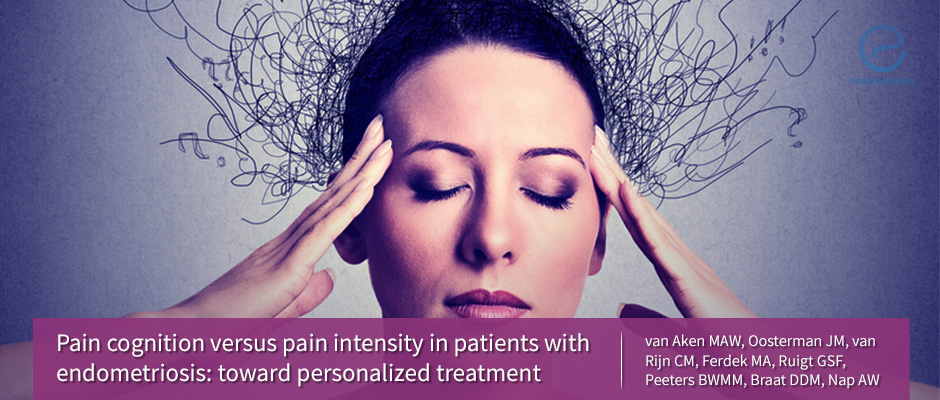Pain cognition and pain intensity are negatively associated with health-related quality of life
Jun 22, 2018
Women with endometriosis could benefit from personalized psychological interventions.
Key Points
Highlights
- For the first time, this unique study analyzed the impact of pain cognition aspects in women with endometriosis and found that pain cognition and pain intensity are negatively associated with health-related quality of life (HRQoL).
Importance
- Negative pain cognition has effects beyond impairing HRQoL. It is a risk factor in the development of increased postoperative pain, chronic pain after surgery, and is associated with over-medication and increased healthcare utilization.
- Medical professionals need to consider adding psychological interventions in the management of endometriosis-related pain where negative pain cognition is involved.
What’s Done Here
- 52 patients and 42 healthy controls between the ages of 18-49 years participated in the study.
- Participants completed questionnaires on HRQoL, pain cognition, and rated their pain intensity.
- Statistical analysis was performed to determine the relationship between pain cognition, pain intensity, and HRQoL.
Key Results
- Endometriosis patients displayed lower HRQoL compared to healthy controls.
- Pain cognition was found to be significantly different in women with endometriosis compared to healthy controls.
- Participants with higher pain intensity reported lower HRQoL.
- A negative correlation was found between the participants’ pain cognition score and the HRQoL.
- A strong positive correlation was found between pain intensity and pain cognition.
- When both the pain intensity and the pain cognition scores were analyzed independently, a significant negative association was found on HRQoL.
Limitations of the Study
- Selection bias while patient selection to include a certain stage may be a factor. Care should be taken to avoid generalization of the results.
Lay Summary
Pain is a personal experience and is different for every individual. Catastrophizing, fear of pain, and hypervigilance to pain are important factors that contribute to pain perception. These factors are described as pain cognition and refer to the negative appraisal of pain, including anxiety surrounding the pain and a constant focus on the pain experience. The effect of pain cognition can sometimes be so severe that it interferes with the effectiveness of medical therapy. The authors hypothesized that pain cognition plays an important role in the quality of life (QoL) of endometriosis patients and therefore explored how pain intensity and pain cognition are related to health-related quality of life (HRQoL) in women with endometriosis. This is the first study to explore this relationship.
The researchers recruited 52 patients and 42 healthy controls between the ages of 18-49 years. Participants completed two questionnaires addressing HRQoL, the standardized Short-Form Health Survey (SF-36), version 2.0, and the Endometriosis Health Profile 30 (EHP-30). They also completed three questionnaires addressing pain cognition, the Pain Catastrophizing Scale (PCS), the Pain Vigilance and Awareness Questionnaire (PVAQ), and the Pain Anxiety Symptoms Scale (PASS). They further rated their pain using the verbal Numerical Rating Scale (NRS). The authors performed statistical analysis to determine the relationship between pain cognition, pain intensity, and HRQoL.
The results of the study confirmed that women with endometriosis have a significantly impaired HRQoL compared with healthy controls. A unique finding not previously reported is that both pain cognition and pain intensity are negatively associated with HRQoL, with pain intensity contributing slightly stronger than pain cognition.
The Fear Avoidance Model provides a theoretical explanation for the results of this study. Individuals who aim to avoid pain tend to catastrophize pain and view it as a threat. This leads to the inability to defer attention from pain signals, causing a hypervigilant state. Consequently, patients withdraw from social activities and have higher levels of distress, disability, and depression, leading to lower quality of life.
The findings of this study have implications for the care of women with endometriosis as negative pain cognition has effects beyond impairing HRQoL. Other studies have found that it is a risk factor in the development of increased postoperative pain and chronic pain after surgery, and is associated with over-medication and increased healthcare utilization. The authors, therefore, suggest the addition of psychological care, specifically cognitive-behavioral therapy, for women with endometriosis who experience negative pain cognition.
Research Source: https://www.ncbi.nlm.nih.gov/pubmed/28911933
Endometriosis health-related quality of life pain cognition pain intensity catastrophising fear questionnaire

